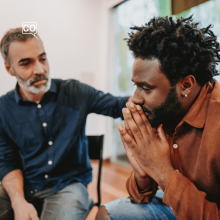Apoyarse (to support oneself) - Subjuntivo presente, subjuntivo (Present subjunctive, subjunctive) - Spanish

Apoyarse - Conjugation of to support oneself in Spanish: Conjugation table, examples and exercises in the present subjunctive, subjunctive tense (Subjuntivo presente, subjuntivo).
Subjuntivo presente, subjuntivo (Present subjunctive, subjunctive)
All conjugations and tenses: Apoyarse (to support oneself) - conjugation and tenses - (Spanish)
Syllabus: Spanish lesson - Trabajo en equipo (Teamwork)
Conjugation of to support oneself in Subjuntivo presente
- yo me apoye I support myself
- tú te apoyes you might support yourself
- él/ella se apoye he supports himself
- nosotros/nosotras nos apoyemos we support ourselves
- vosotros/vosotras os apoyéis You support yourselves
- ellos/ellas se apoyen they support themselves
Example phrases
- Espero que yo me apoye en la naturaleza para relajarme. I hope that I support myself with nature to relax.
- Ojalá tú te apoyes en tus amigos cuando tengas problemas. I hope that you support yourself on your friends when you have problems.
- Es importante que él se apoye en su familia. It is important that he supports himself with his family.
- Deseamos que nosotros nos apoyemos en el pino para descansar. We wish that we support ourselves on the pine to rest.
- Es bueno que vosotros os apoyéis en el roble para sombra. It is good that you support yourselves on the oak tree for shade.
- Quiero que ellos se apoyen en mí cuando necesitan ayuda. I want them to support themselves on me when they need help.
Exercise: Conjugate the verbs - apoyarse (to support oneself)
Instruction: Choose the correct word, read the sentence out loud and translate.
Show answers Show translationApoyarse (Subjuntivo presente, subjuntivo)
1. Quiero que ellos ... en mí cuando necesitan ayuda.
2. Es bueno que vosotros ... en el roble para sombra.
3. Ojalá tú ... en tus amigos cuando tengas problemas.
4. Espero que yo ... en la naturaleza para relajarme.
5. Deseamos que nosotros ... en el pino para descansar.
6. Es importante que él ... en su familia.